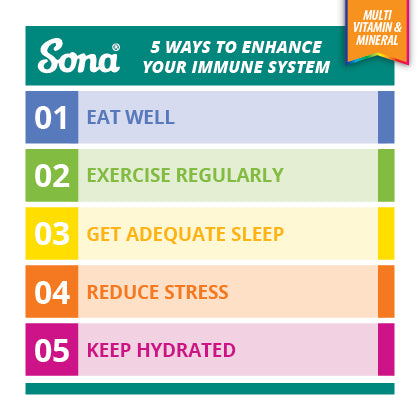
The immune system is a complex network of organs, cells, and proteins, that work together to defend the body against outside invaders, such as, bacteria, viruses, fungi, and toxins. However, sometimes the immune system fails, and can allow a harmful invader to enter the body, and potentially cause you to become sick.
In recent years, more research has been carried about the intricacies and interconnectedness of the immune response. As of yet, there are no scientifically proven direct links between lifestyle and enhanced immune system support. Nevertheless, there has been some correlation between general healthy-living strategies and enhanced immune function.
Below are 5 things that researchers believe could enhance immune function:
- Consume plenty of fruits and vegetables: Like most aspects of health, consuming a diet high in fruit and vegetables has shown to enhance immune function. Fruits and vegetables are rich in micronutrients that play a key role in supporting the immune system. This includes vitamin B6, vitamin C, and vitamin E.
If you struggle to consume a variety of fruits and vegetables, Sona MultiPlus Time Release is a comprehensive one-a-day multivitamin/multimineral that provides a full spectrum of 27 essential vitamins, minerals, and trace elements necessary for good health in a Time Release formula ensuring maximum benefit throughout the day. Each tablet contains 25mg of vitamin B6 (1786% NRV), 200mg if vitamin C (250% NRV), and 20.5mg a-TE of vitamin E (114%).
- Exercise regularly: It is suggested that exercise will also improve immune system function since it boosts overall body circulation, making it easier for immune cells and additional disease-fighting molecules to travel withing the body.
- Get adequate sleep: Sleep is important for virtually every bodily system. While we sleep, various infections-fighting molecules are created, while production of others are increased. Moreover, sleep enhances immune memory. Immune memory refers to the record of every detrimental invader it has fought against previously the immune system keeps, so it can quickly kill the invader if it re-enters the body again. A lack of sleep can weaken this process, thus decreasing the immune system’s ability to remember how to recognize and react to dangerous invaders.
- Reduce stress: During periods of stress, particularly periods of chronic stress, the body responds by initiating a stress response. When a stress response is initiated, the body could potentially release substances like adrenaline and cortisol, to help you better prepare to fight against the stressor. In turn, this suppresses immune function, increasing the risk of infection and disease.
- Keep hydrated: Lymph, a fluid in your circulatory system that transports essential infection-fighting immune cells across your body, is mostly water. Dehydration causes lymph to travel more slowly, which can cause issues with your immune system.
References
- Besedovsky, L., Lange, T., & Born, J. (2012). Sleep and immune function. Pflugers Archiv : European journal of physiology, 463(1), 121–137. https://doi.org/10.1007/s00424-011-1044-0.
- Brolinson, P. G., & Elliott, D. (2007). Exercise and the immune system. Clinics in sports medicine, 26(3), 311–319. https://doi.org/10.1016/j.csm.2007.04.011.
- Childs, Calder, & Miles. (2019). Diet and Immune Function. Nutrients, 11(8), 1933. doi: 10.3390/nu11081933.
- How to boost your immune system - Harvard Health. (2021). Retrieved 26 July 2021, from https://www.health.harvard.edu/staying-healthy/how-to-boost-your-immune-system.
- Mitchell, J. B., Dugas, J. P., McFarlin, B. K., & Nelson, M. J. (2002). Effect of exercise, heat stress, and hydration on immune cell number and function. Medicine and science in sports and exercise, 34(12), 1941–1950. https://doi.org/10.1097/00005768-200212000-00013.
- Pruett S. B. (2003). Stress and the immune system. Pathophysiology : the official journal of the International Society for Pathophysiology, 9(3), 133–153. https://doi.org/10.1016/s0928-4680(03)00003-8.
